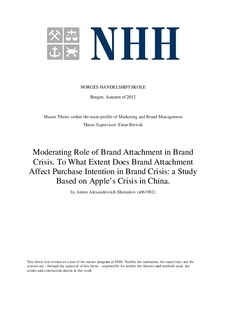| dc.contributor.author | Shestakov, Anton Alexandrovich | |
| dc.date.accessioned | 2013-04-19T08:32:38Z | |
| dc.date.available | 2013-04-19T08:32:38Z | |
| dc.date.issued | 2012 | |
| dc.identifier.uri | http://hdl.handle.net/11250/169559 | |
| dc.description.abstract | Brand crisis can often lead to negative publicity which substantially affects purchase intention. Brand attachment, on the other hand, possesses marketing value since it helps the consumer choose a brand from a set of available brands in a certain market, has a positive effect on repeat purchase, and provokes the willingness to recommend a brand. This study attempts to examine purchase intention after Apple’s employee management crisis in China. It will do so by testing the blame attribution model by Bråthen (1999), and including brand attachment as a moderator. This model utilizes attribution theory which explains how consumers attribute causation to the crises and which factors affect consumer behavior (purchase intention) as a result of this attribution. Empirical testing using a questionnaire of 80 NHH students confirmed most of my hypothesized effects, presented in the analysis, except for the insignificant moderating effect of brand attachment on perceived control over employee management by industry and the nature of relationship between the two variables. Finally, managerial implications, suggestions for future research and limitations of my findings are discussed. | no_NO |
| dc.language.iso | eng | no_NO |
| dc.subject | marketing and brand management | no_NO |
| dc.title | Moderating role of brand attachment in brand crisis. To what extent does brand attachment affect purchase intention in brand crisis: a study based on Apple’s crisis in China. | no_NO |
| dc.type | Master thesis | no_NO |
| dc.subject.nsi | VDP::Social science: 200::Economics: 210::Business: 213 | no_NO |
